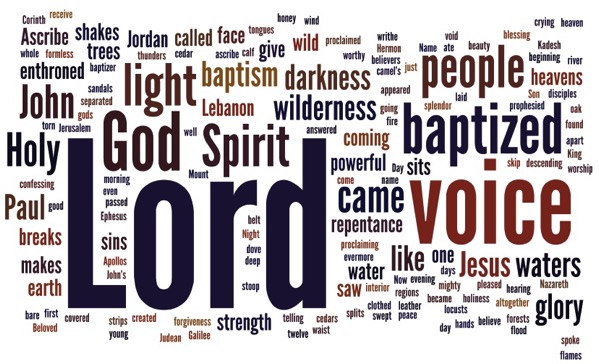1 Epiphany
Gen. 1:1-5 • Ps. 29
Acts 19:1-7 • Mark 1:4-11
“The voice of the Lord is upon the waters” (Ps. 29:3). Before the voice there was the wind, wordless power trembling over a void of formless night, blackness, a watery deep. Before the wind and water and the murky earth, before even heaven and earth, there was pure essential silence and absolute nothingness. And yet, though there was no thing, there was all fullness, for there was God. God sits enthroned in perfection, the font of all love, all love begotten, all love shared. God need not seek perfection externally. Enthroned, God sits. The corners of the divine mouth lifted slightly, God is content. Why did God create?
Consider one answer: “He who created it created everything for love, and by the same love is it preserved, and always will be without end” (Julian of Norwich, Showings, longer text, chap. 8). Consider this too: “The love of God is pouring and creating goodness in all things …. So Dionysius says, ‘This ought to be said in truth, that God himself is the cause of all things through the abundance of his loving goodness, and that by provident action he goes outside himself to every existing thing” (St. Thomas Aquinas, Summa Theologiae I 20, 1; my trans.). Love is the beginning, the still point before Genesis 1:1; and yet love is the going forth that causes heaven and earth and water to be.
An infinitesimal moment after creating, “the Lord sits enthroned above the waters” (Ps. 29:10). God looks down upon heaven and earth and a swirling sea. God’s Spirit has a powerful voice that breaks, splits, and shakes the formless void (Ps. 29:5-8; Gen. 1:1). God moves over the face of the waters and speaks in love: “Let there be light.” Thus, order, distinction, intelligibility, and purpose grounded in love come to be. Creation is and is preserved by Love.
Yet we fear to believe it. “Love bade me welcome; yet my soul drew back, guilty of dust and sin” (George Herbert). Not the soul only, but the body too, and nature herself show signs of a deep-down weariness. Would Love itself love a second time, love what is guilty and weak and frail? God moves over the face of the waters, calls his prophet to the river’s edge. And the prophet chants hymns of hope and washes with waters of life. He makes disciples in the thousands. The prophet’s name is John, and though he is clear in pointing to the One who is to come, his overwhelming power and presence sounded in arid voice and displayed in dress of camel’s hair and a leather belt fix the hearts of so many. Thus they stay when they should go. Having the baptism of John, they have not yet heard of the Holy Spirit. St. Paul finds these people in the interior region of Ephesus (Acts 19:1).
Paul teaches: “John baptized with the baptism of repentance, telling the people to believe in the one who was to come after him, that is, in Jesus” (Acts 19:4). Hands held out, Paul invokes the Spirit, and the people speak in new tongues and prophesy and become a new apostolic band of about a dozen (Acts 19:7). A church is thus constituted, a new community over which the Spirit moves, a new humanity, a new cloth, new wine, a new name and a new song, a new commandment (“Love one another as I have loved you”), and a new creation (“Behold, I make all things new”).
God said, “Let there be light,” and suddenly the true Light that enlightens everyone illumined a new world.
Look It Up
Read Mark 1:11. The torn heaven speaks to you.
Think About It
Pouring out and creating.
TLC on Facebook ¶ TLC on Twitter ¶ TLC’s feed ¶ TLC’s weblog, Covenant ¶ Subscribe










